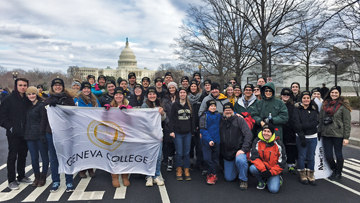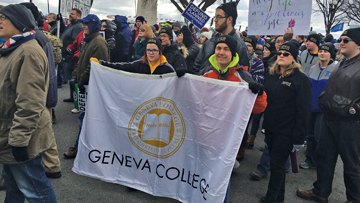You have free articles remaining this month.
Subscribe to the RP Witness for full access to new articles and the complete archives.
As one of hundreds of thousands of people at the March for Life in Washington, D.C., on Jan. 27, 2017, I was genuinely pleased to be led on the trip by two Geneva College students. Michael Shemer and Laura O’Neil, both freshmen, had independently organized and paid for a bus of students, faculty, and community members to attend.
Michael Shemer transferred to Geneva College after discovering the intentional integration of faith and learning characterized by our curriculum. Upon arriving in January, he spent the duration of his orientation attempting to find out if Geneva had ever sent a bus to the March of Life.
“I’m pro-life, I fight for the things I believe in, and I want[ed] a large turnout at the March for Life,” he explains. Michael’s eagerness to help lead a group of students to the March for Life, fronting the money for the coach bus and planning the event with Laura, demonstrates his love for living out his faith.
In looking back, Shemer reflected on the power of God to make things happen: “With this project, we’ve seen miracle after miracle, barrier after barrier crushed by God.”
Geneva is well acquainted with God’s power over barriers. Just last March, Geneva’s case against certain aspects of the U.S. government’s Affordable Care Act was made before the country’s Supreme Court. Geneva stood against a clause requiring employers to carry plans that supply abortifacients. This clause contrasts with the college’s mission to prepare students for a life of faithful service to God and neighbor. God’s example to us of this kind of service began with the birth of a child.
Michael and Laura’s bravado may have been the spark that prompted me to join the trip and bring along my five-year-old daughter, Helen. Some might question the wisdom of taking a young child to a rally where you can expect some shouting and graphic pictures of aborted children. My wife and I thoughtfully considered the question for our daughter. How can you explain to a child the act of abortion, let alone the motive behind it?
Many parents attending the March for Life made the same decision. Among the crowd were families with their children in strollers and backpacks. Their mere presence was a protest against abortion’s devaluing of a child’s life. Several faculty members from the college also brought their children. Linda Sumner, Geneva’s women’s soccer coach, rode the bus with her two daughters, Jamie and Erica. Scott Shidemantle, from the Bible department, brought his youngest son, Luke. It was encouraging to see that others had the same inclination.
When asked why he chose to do this, Dr. Shidemantle noted, “The Scriptures teach us that we are to teach [our children] the faith as we sit in our houses, walk along the road, lie down, and get up (Deut. 6:7). This was an opportunity to teach an important Christian principle, literally as we were walking along the road.”
This was my first time attending the march as a father, and the significance of the event took on new importance for me. But then again, I was on the bus with a lot more children than my daughter. My work as a teacher primarily requires spending time with other people’s children. So even without Helen, I was accompanied by several children who were a sign of their mother’s choice to give birth, to nurture, and to care for their lives. That choice to cherish and love their children from conception to maturity had resulted in an eager bunch of protesters popularly known as the Pro-Life Generation. In the students’ steady hopefulness we observed a starkly simple truth. Life is a miracle, and with the birth of every baby comes the possibility of something new: a new life, a new law, a new land.
The march is largely a quiet affair. In many ways it is similar to the quiet resistance of having children and raising a family. The first part of the event involved a great deal of standing and waiting. It didn’t feel much like political activism. We were all milling around waiting—waiting for something to move. Then again, don’t most things of importance take exactly this kind of time? We had been urged by a speaker during the pre-march rally to not let this one day be our only act against legal abortion. He warned against the pitfall of event-driven politics that didn’t overflow into the day-to-day work of changing our country’s laws. In the moment, it was tempting to begin thinking of all the things that could be done, actions that could be taken to show our opponents our power and influence.
The march, in this context, seems incidental, as if we weren’t really doing anything to move legislation along. The march, as political action, was sluggish. Even as we marched along, there were few people out to observe the occasion of over 500,000 people making their way up Constitution Avenue toward the Capitol. Some members were tempted to step out of line and take to the sidewalk so they could walk more quickly past the main group of protesters. After all, wasn’t the entire point to reach the Capitol, to surround the building as a sign of mass resistance to a law that threatens every child conceived without a plan? Action, as an urgent event, entices us to think that measured, silent movement may not be the way to approach problems. However, the actual circumstances of the march may prepare us for what it means to raise up the next generation of faithful Christ-followers.
Contemporary trends surrounding childbirth demonstrate this temptation. We reveal the conception of a child with an announcement featuring cleverly designed pictures. We reveal the gender of a child with a party that intends to surprise even the happy couple. We see couples hyping the announcement of a child’s name and the first birthday party. For those of us who have been given children, we soon realize that event-based parenting in no way compares with the importance of everyday care. Children are invited into maturity and growth not by mountaintop moments, but by the ordinary repetition of meals, bedtimes, and baths. The raising of a child, even the nine months of waiting for a child, requires a good deal of sincere, faithful plodding.
The March for Life, in another way, reminds us of the Israelites’ conquest of Canaan and their first stop at the city of Jericho. Instead of setting up a siege and preparing for an assault, the Israelites were instructed to simply march around the city. For six days, the men of Israel marched around the city without a sound. On the seventh day, they raised the battle cry and the walls of the city came down.
Even now, with the federal administration’s sympathetic stance on pro-life principles, it is hard to believe that marching can accomplish the monumental victory of banning abortion. One gets a similar feeling when we think about the time required to raise up a child to fear the Lord and to know Jesus as their Savior and friend. We know, however, that with God both works are possible and certainly worth our effort. Possible and worthwhile because we know it is neither our power nor our influence that ensures an end to death, even death in the womb.
As Michael Shemer noted, God “crushed a number of barriers” in order to make the Geneva trip happen. These barriers seem small compared to the legislative barriers that stand between our hopes and the lives of our country’s children. This year’s theme for the march was “The Power of One,” signifying a unified voice raised against the laws that leave unborn children defenseless against more vocal claims. We can, however, rest assured that our power lies in the power of one Lord, one Giver of life, who in His love advances slowly towards the gates of death, against which He will prevail.

